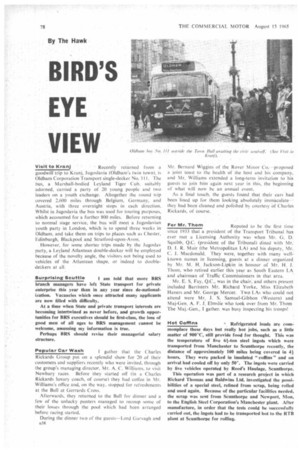BIRD'S EYE VIEW
Page 80

If you've noticed an error in this article please click here to report it so we can fix it.
Visit to Kranj Recently returned from a
goodwill trip to Kranj, Jugoslavia (Oldham's twin town), is Oldham Corporation Transport single-decker No, III. The bus, a Marshall-bodied Leyland Tiger Cub, suitably adorned, carried a party of 20 young people and two leaders on a youth exchange. Altogether the round trip covered 2.600 miles through Belgium, Germany, and Austria, with three overnight stops in each direction. Whilst in Jugoslavia the bus was used for touring purposes, which accounted for a further 800 miles. Before returning to normal stage service, the bus will meet a Jugoslavian youth party in London, which is to spend three weeks in Oldham. and take them on trips to places such as Chester. Edinburgh, Blackpool and Stratford-upon-Avon.
However, for some shorter trips made by the Jugoslav party, a Leyland Atlantean double-decker will be employed because of the novelty angle, the visitors not being used to vehicles of the Atlantean shape. or indeed to doubledeckers at all.
Surprising Scuttle I am told that more BRS branch managers have left Stale transport for private enterprise this year than in any year since de-nationalization. Vacancies which once attracted many applicants are now filled with difficulty.
At a time when State and private transport interests are becoming intertwined as never before, and growth opportunities for BRS executives should be first-class, the loss of good men of all ages to BRS management cannot be welcome, assuming my information is true.
Perhaps BRS should revise their managerial salary structure.
I gather that the Charles Rickards Group put on a splendid show for 20 of their customers and suppliers recently who were invited, through the group's managing director, Mr. A. C. Williams. to visit Newbury races. Before they started off (in a Charles Rickards luxury coach, of course) they had coffee in Mr. Williams's office and, on the way. stopped for refreshments at the Bull at Gerrards Cross.
Afterwards, they returned to the Bull for dinner and a few of the unlucky punters managed to recoup some of their losses through the pool which had been arranged before racing. started.
During the dinner two of the guests—Lord Ciarvagh and 1)3a •
Popular Car Wash
Mr. Bernard Wiggins of the Rover Motor Co.--proposed a joint toast to the health of the host and his company, and Mr. Williams extended a long-term invitation to his guests to join him again next year in this, the beginning of what will now be an annual event.
As a final touch, the guests foUnd that their cars had been lined up for them looking absolutely immaculate • they had been cleaned and polished by courtesy of Charles Rickards, of course.
Reputed to be the first time since 1933 that a president of the Transport Tribunal has ever met a Licensing Authority was when Mr. G. D. Squibb, Q.C. (president of the Tribunal) dined with Mr. D. 1. R. Muir (the Metropolitan LA) and his deputy. Mr. C. J. Macdonald. They were, together with many wellknown names in licensing, guests at a dinner organized by Mr. M. H. Jackson-Lipkin in honour of Mr. H, J. Thom, who retired earlier this year as South Eastern LA and chairman of Traffic Commissioners in that area.
Mr. E. S. Fay, Q.C., was in the chair, and others present included Barristers Mr. Richard Yorke, Miss Elizabeth Havers and Mr. George Mercer. Two LAs who could not attend were Mr. J. S. Samuel-Gibbon (Western) and Maj-Gen. A. F. J. Elmslie who took over from Mr. Thom The Maj.-Gen., I gather. was busy inspecting his troops!
For Mr. Thom • Refrigerated loads are commonplace these days but really hot jobs, such as a little matter of 900°C, still provide food for thought. This was the temperature of five 61-ton steel ingots which were transported from Manchester to Scunthorpe recently, the distance of approximately 100 miles being covered in 4.1 hours. They were packed in insulated " coffins " and on arrival had cooled off by only SO°. The ingots were carried by five vehicles operated by Reed's Haulage. Scunthorpe.
This operation was part of a research project in which Richard Thomas and Baldwins Ltd. investigated the possibilities of a special steel, refined from scrap, being rolled and used again. Because of the particular facilities needed, the scrap was sent from Scunthorpe and Newport, Mon. to the English Steel Corporation's Manchester plant. After manufacture, in order that the tests could be successfully carried out, the Ingots had to be transported hot to the RTB plant at Scunthorpe for rolling. Hot Coffins




























































































































